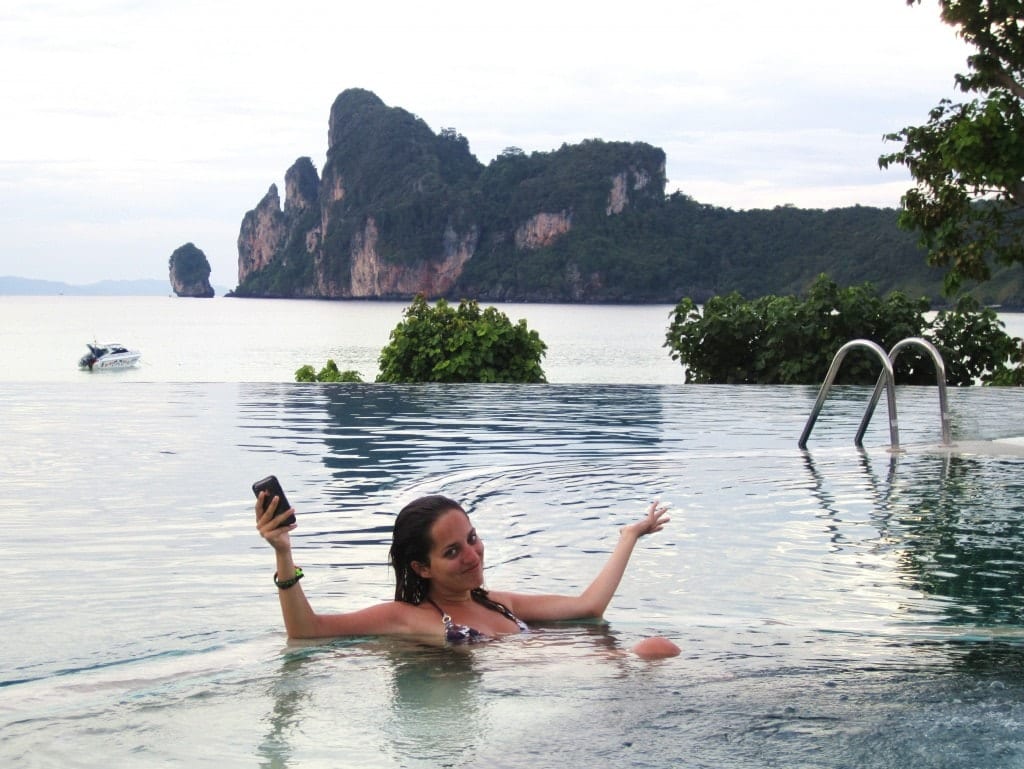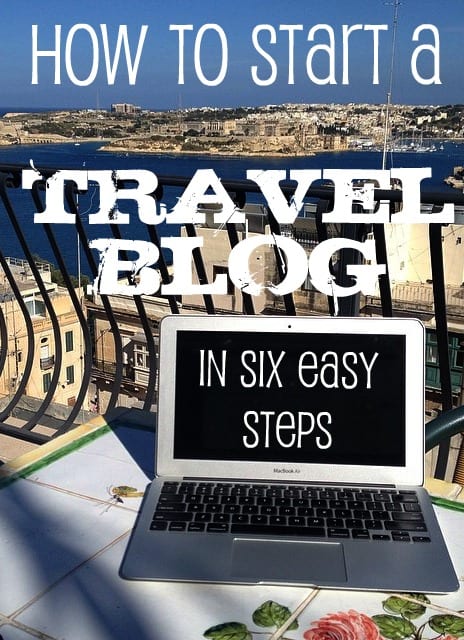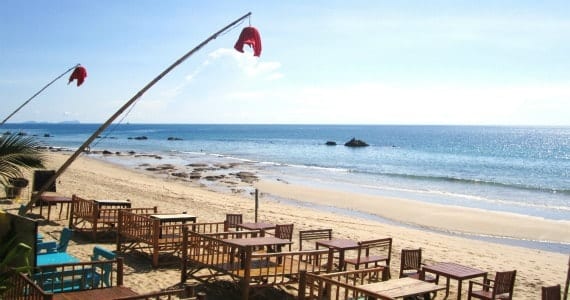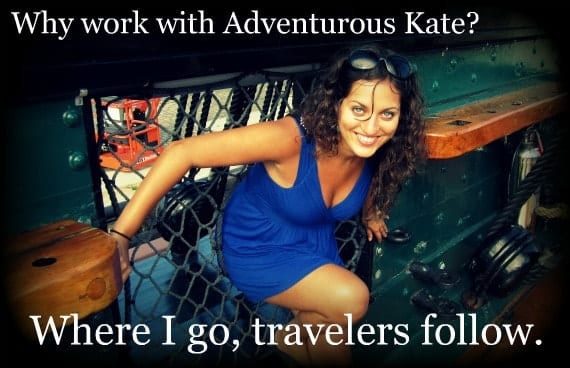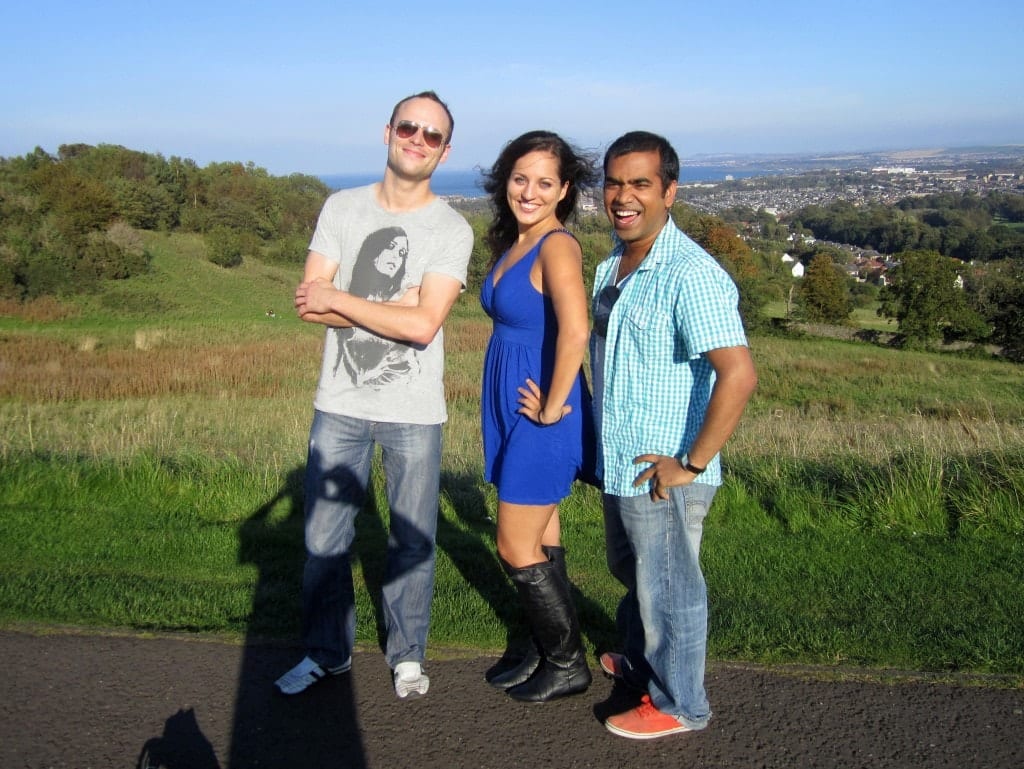Adventurous Kate contains affiliate links. If you make a purchase through these links, I will earn a commission at no extra cost to you. Thanks!
Becoming a professional travel blogger has been a dream come true for me in so many ways. I’ve found a way to get paid for my favorite hobby, and do so while following my dream of traveling the world.
Sometimes I can’t believe this is my life. Six weeks ago, I was invited on a monthlong press trip to Australia — and had to turn it down, as I had prior commitments. Until recently, never in my life did I believe that I would be offered a free monthlong trip to Australia out of the blue, much less turn one down!
Not surprisingly, people ask me all the time how they can do what I do. The short answer I give them is that travel blogging requires a tremendous amount of work, as well as a tremendous investment of time and effort before you begin to see any benefits.
Ready to start a travel blog? Click here to get started!
There are a number of posts about travel blogging telling people that if they can dream it, they can do it! While encouragement is nice, many of these posts are short on reality.
The truth? Almost all of you who start travel blogging with the hopes of doing it full-time will have given up a year from now.
Having been a blogger for ten years, a travel blogger for two years, and a full-time, professional travel blogger for a year and a half now, I’ve put together a list about the reality of this career.
Note: The following list is about being a professional travel blogger — not necessarily someone who makes his or her income online and also happens to be a travel blogger, nor someone who uses travel blogs primarily as link farms.
The Reality of Being a Professional Travel Blogger
You will work harder than you ever have in your entire life.
If you dream of having a four-hour workweek, this is not the career for you. Look into passive income. Don’t become a professional travel blogger.
It might seem like I do little more than write posts. That’s just a small part of it. The rest is spent responding to potential advertisers, reaching out to would-be advertisers, editing photos, editing videos, assembling promotional materials, pitching travel and tourism contacts, writing for other sites, Facebook group networking, tweaking site design, tracking financials, link building, doing keyword research, reading other travel blogs, and maintaining a presence on social media. To start.
When you’re a travel blogger, the work is never done. There is always something else that you could be doing, but there just aren’t enough hours in the day.
Your travel blog is your life.
You will not succeed at travel blogging unless you produce content prolifically – at least at first. This means that you will need to work at least a few hours each day. Working this much means that you will be miserable unless you genuinely love it.
I don’t love everything I do as a blogger, and I’m not always in the mood to do the things I do enjoy – but as a whole, this is something that I love. I love the work. I love the people. I love the conferences and events, and I love the seminars that teach me more about this field. Travel blogging exhilarates me, and that’s what keeps me going.
This translates into a bit of workaholism, and it’s hard for other people to understand this, especially my family and friends. When your career and passion are the same thing, you need to point out — often with frequency — just how necessary it is for you to work all the time.
You won’t make money for a long time.
The general rule is that you shouldn’t expect money for the first year. Most advertisers, whether they be link agencies or travel companies, won’t work with a site less than one year old. Why not? You haven’t proven yourself as an investment yet.
While there are exceptions – I began making money about six months in – you should be prepared to not make anything for the first year. What’s nice is that it weeds out the people who aren’t serious.
The money ebbs and flows.
Entrepreneurs and freelancers of all kinds will be able to relate to this point – most of the time, it’s either feast or famine. I have some steady contracts with advertisers, but most of the money is not made regularly. Either I’m making far more than I need or I’m not making nearly enough.
Those lean times are scary. It’s important to have savings and diversify your income as much as possible, but even more important is asking yourself whether you’re prepared to handle the emotional roller-coaster that is entrepreneurship.
It’s nearly impossible to make a living from one site alone.
Yes, some people are able to make a full-time income from one site – but they are in a very small minority.
No matter how you make your money, chances are that you will be part of the 98% that needs multiple sites in order to make a living, rather than the 2% who can get by with one.
Living cheaply abroad may be necessary.
For most professional travel bloggers, it takes a long time to earn an income that would be enough to live on in North America or Western Europe. Many make the decision to live abroad in a cheap country for that reason.
One of the main reasons why so many travel bloggers live in Chiang Mai, Thailand, is that you can live very well there for very cheap. $800 a month could cover rent in a nice place, food, cable, internet, and most everything you would need for a month in Chiang Mai, plus a bit of travel within Thailand, too.
$800 a month, by contrast, is what I paid for half of a one-bedroom apartment in downtown Boston.
Being a great writer and a great blogger are two very different things.
Writing for the internet is different from any other kind of creative writing you’ve done before. You’re writing to engage people with a short attention span who are reading your blog while being bombarded by major distractions like Facebook.
You could write exquisite, intricate, heartbreakingly beautiful prose that would win you awards in a long-form memoir or a collection of essays. But when you use this kind of writing on a blog, you’ll likely end up with a few comments of, “Wow, you’re a great writer!” without the traffic to back it up. It’s simply not engaging to most readers.
Take my favorite author – Lionel Shriver, who wrote We Need to Talk About Kevin and The Post-Birthday World. I adore her exquisite writing, which makes me feel smarter just for having read it. But if she wrote a blog in the style of her books, very few people would read it.
This is not to say that good writing isn’t appreciated. There are quite a few travel bloggers who are talented storytellers — Wes Nations and Lauren Juliff and Mike Sowden come to mind. You need to write well, but in order to attract the masses, your writing needs to be digestible to casual readers.
You will never travel the same way again.
When you’re a professional travel blogger, you don’t get time off, which means you can never go completely off the grid. Sometimes you can plan ahead by scheduling posts, tweets, and Facebook shares, but when travel blogging is your main form of income, you can’t step away from your email for long.
In San Antonio, Texas, my mom and sister went out for margaritas on the Riverwalk every night while I stayed in and worked. In Hoi An, Vietnam, my friends had a blast at the My Son ruins, which I skipped because I needed to work. In Sayulita, Mexico, the girls in my group went to a cooking demonstration that I really wanted to experience – but I couldn’t, because I had work to do.
I’m not complaining. I think the trade-off is very fair. And since I travel solo most of the time, it’s easy for me to travel slowly and build in extra days to be spent working. It’s more difficult when I travel with others.
This spring, I’ll be taking my first vacation in more than two years. And I can only do it because I’m hiring someone to run my site in my absence.
Press trips don’t pay the bills.
Press trips can be amazing. I feel privileged to have worked with some fantastic tourism boards and travel companies that have chosen to invest in my site, and to have experienced some amazing destinations as a result.
But in nearly all instances, travel bloggers don’t make money for these trips. In fact, we lose money because we’re losing time that could be spent working.
That’s not to say that they won’t pay off in the future for smart, resourceful travel bloggers who parlay their relationships with these companies into creative new opportunities. But for the press trips themselves, you won’t earn money.
I actually believe that a few years from now, it will be standard practice to pay professional travel bloggers to attend press trips. But that’s not the case just yet.
Doing it alone is a challenge in itself.
Running a business entirely by yourself is extremely challenging. Everything, from the creative aspects to the business aspects, comes down to you, regardless of what your strengths and weaknesses may be. It doesn’t matter. You’re responsible for it all, and it’s a pile of never-ending work.
This is the double-edged sword of self-employment. It’s wonderful not to have a boss anymore and to be able to work for your own interests — but can you trust yourself to do the work when someone isn’t imploring you to do so?
This effect is somewhat mitigated for multiple people running a travel blog together. When you have two or more people working on one site, you’re able to get a lot more done – particularly if you play to each other’s strengths. Consequently, you’ll need to earn a higher income to support more than one person.
(For what it’s worth, I’ve been told that all the benefits of having two people go out the window if you have young children.)
The industry is evolving constantly.
While all industries are evolving, the travel blogging industry is zooming ahead at the speed of lightning. It’s still a very new industry, even compared to other blogging industries like mommy blogging, fashion blogging, even food blogging.
People are still figuring out what to make of us. Being a blogger doesn’t exactly sound like a potential career. Most people have no clue that we can make money, let alone be valuable entities that can reach tens of thousands of readers each month.
If you’re going to become a professional travel blogger, you need to commit to networking constantly with other travel bloggers and reading everything you can about the industry. If not, you’ll fall behind.
BUT – things are getting better all the time. One thing that many travel bloggers are doing these days, myself included, is partnering with companies to do paid work in additional to working in exchange for travel.
You need to be one arrogant motherf*cker.
At times, it seems like the travel blogging community is a bastion of helpful support and group hugs. And it is – I love that more experienced bloggers often pitch in to help newbie bloggers, or even each other when we’re stuck.
But we’re also competing with each other. We compete for spots on press trips. We compete for sponsorships and partnerships. We compete for speaking gigs. We compete for funding to be spent on us.
If you’re going to compete in this space, you need to be able to convince companies to invest in you. And wooing companies requires different skills than wooing readers.
You need to approach companies with confidence and, after they tell you they’re considering working with a blog with double the pageviews, you need to be ready to smile and explain what makes you a better choice. You need to do this with charm, and grace, and humor.
At the end of the day, people want to feel good about themselves. Travel companies are run by people. Your job is to make them think that working with you is the best damn decision they could make for themselves.
Can this be taught? To a degree. It’s a tough line to walk – being cocky but approachable, arrogant but polite, and supremely confident of the belief that no other blog can even approach yours when it comes to quality.
Modesty does you no favors here.
It’s for the love of blogging.
Your love of travel has very little to do with your ability to succeed as a travel blogger. Sure, cool travel experiences lead to good potential content, but being a compelling blogger depends on what you do with that content.
Most of the successful travel bloggers I know became travel bloggers because they loved the act of blogging, and also loved blogging about travel. The least successful ones are people who wanted to make money while traveling and thought blogging would be a way to do it. Most people fall somewhere in between.
You are nothing without your readers.
Your readers are the single greatest asset you have. Travel companies and tourism boards work with bloggers because they have devoted audiences who trust them.
The moment you take advantage of your audience, you are destroying your most precious asset. What’s considered taking advantage of your readers? It’s your call. For me, it’s publishing anything that I myself wouldn’t want to read.
You have friends around the world.
This piece has been a bit of a downer, so let me end it on a nice note: travel bloggers are wonderful. I’m very fortunate to count travel bloggers among my closest friends.
I love that I can travel almost anywhere in the world and have either a blogger or a reader say, “You want to meet up while you’re here?” That’s amazing. That’s a gift, and one that I hope I always treasure.
